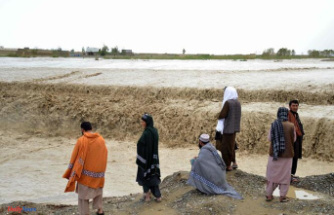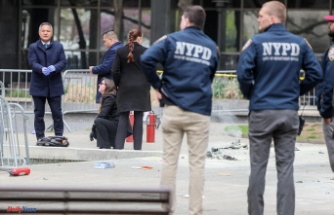Video by Kyle Hughes, NYSNYS.com
Albany
Gov. Andrew Cuomo on Tuesday repeated his 6-week-old assurances that the state is working with the city of Albany and Mayor Kathy Sheehan to find a way for the state to help close the looming $12.5 million gap in the city's budget.
In a Q&A from the Capitol's Red Room, Cuomo said he understood the city's predicament — though his sympathies only seemed to go so far.
"Let's say a city is running well, and then puts up its hands and says, 'I want $12 million.' That doesn't mean you're going to get $12 million, (just) because you're running the city well," he said. "It's your job to run the city well."
There was no additional aid for Albany in Cuomo's executive budget proposal, or the amendments he offered to the plan earlier this month. That second absence led Sheehan to announce a hiring freeze, and subsequently recruit regional state lawmakers to launch a campaign, called "FairShare4Albany," to draw attention to the city's fiscal peril.
Caption
Close
Sheehan, like Cuomo a Democrat, has made the case that the city has done everything possible to work within its existing resources, and has jumped through every hoop held up by the state — including signing up for Cuomo's Financial Restructuring Board process. A report on the city's financial picture that emerged from that participation has yet to be released by the state Budget Division, which claims it is still being finalized.
Although Sheehan has noted the large amount of land within the city limits that are state-owned and therefore off the tax rolls, Cuomo said the needs of every municipality needs to be balanced in the state budget.
"When we do the budget, there has to be fairness, there has to be an equity — what are you giving Albany? What are you giving Rochester? What are you giving Syracuse? What are you giving Utica, et cetera?" he said. "Because obviously there are many cities in the state that have an extraordinary financial need. Having said that: We're talking to the city, I understand their situation. We go through this every few years, and we hope to be responsive."
The governor sounded unconvinced by Sheehan's argument that the city receives far less in terms of per-capita state Aid and Incentives to Municipalities funding compared to other upstate cities.
"I haven't studied the numbers, but every city has a rationale by which they should get more money, right?" Cuomo said. "Some will argue per capita, some will argue proportionately, some will argue historic need. But every city has an argument for why it should get more funding. ... If you look at our track record, we have always been responsive to the city of Albany to the best of our ability, right? They host the state government; we understand that they carry a burden for the state having the government here. So we have gone out of our way to be responsive, and we will again this year, but it has to be part of the overall discussion."
Recent state aid packages to Albany have come in the form of "spin-ups," or advances on the state's Payments in Lieu of Taxes on the Empire State Plaza complex. While the spin-ups have closed the immediate city budget gaps, they are being drawn against future revenue the city won't receive in the years to come.
Sheehan spokesman Brian Shea said the city believes it has "made a compelling case to the governor. ... We will continue to engage both the governor's office and our partners in the Legislature as the budget is negotiated over the next month."
Tuesday's news conference also included the announcement of the administration's intention to introduce legislation that would raise the minimum age to be married in New York by requiring parental and judicial consent before a marriage license can be given out to a 17- or 18-year-old.
The legislation calls on judges to ensure neither party has a history of domestic violence or any orders of protection against them, or is a registered sex offender. Judges would be required to conduct an in-person interview with the minor to make sure that person is not being coerced into marriage.
The legislation would make it a misdemeanor to give a marriage license out to anyone younger than 17. Current state law sets the minimum age to be married at 14 years old. Parental and judicial consent is needed to marry for 14- and 15-year-olds. For those 16 to 18, consent of both parents — or if both are dead, a guardian — is required before a minor can receive a marriage license.
Lawmakers are pushing a similar proposal, which would raise the minimum age to be married to 17.
Asked during the meeting how the Assembly and Senate would react to the Cuomo bill, Lt. Gov. Kathy Hochul, who was tasked with presenting the bill's broad points, said that if needed, "We can shame them" into supporting the legislation.
Hochul said there are an estimated 4,000 minors married statewide, "primarily under duress and coercion."
"The majority of these were minor girls marrying adult men, which is appalling," she said. "When they get into these situations, you find out some horrific statistics. They have a greater chance of being beaten by a spouse if they marry before the age of 21. Tremendous likelihood of being in poverty, dropping out of school. ... This is just too young an age to take on those responsibilities."
More than two dozen Assembly members are backing Assemblywoman Amy Paulin's child marriage proposal. Only one senator, sponsor Republican Sen. Andrew Lanza, has signed onto the bill in the Senate.
In the Q&A, Cuomo batted back at critics of his economic development programs, saying that adequate independent oversight of those projects currently exists. "You do have independent oversight, right? That's called 62 district attorneys, an attorney general, U.S. attorneys in the Southern District, Northern District, et cetera," he said. "That is independent oversight. Obviously it's been effective independent oversight. So you can't say there isn't independent oversight."
Still, Cuomo is proposing the creation of a chief procurement officer within the executive branch, a post that would be filled by his appointment. Additionally, he is seeking to expand the role of the state inspector general to have oversight of the nonprofit organizations and foundations controlled by the SUNY and CUNY systems.
cseiler@timesunion.com • 518-454-5619 • @CaseySeiler
Our editors found this article on this site using Google and regenerated it for our readers.












